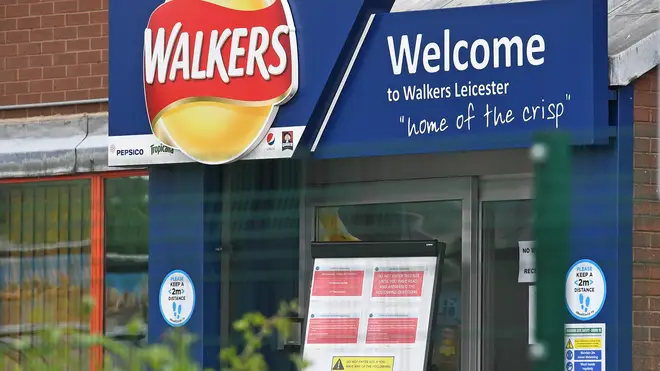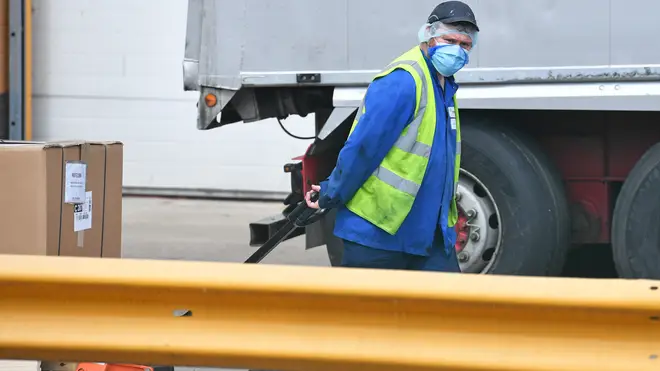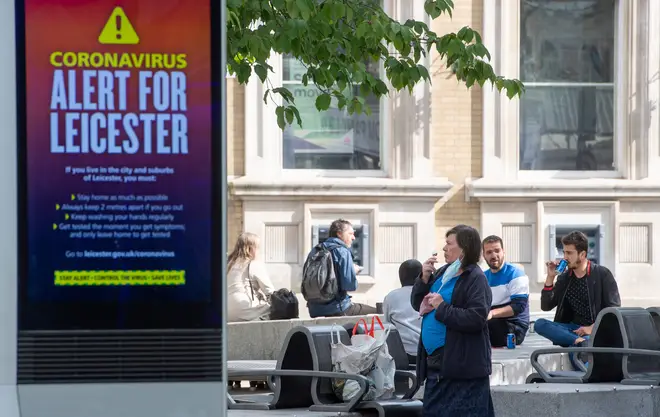
Nick Abbot 10pm - 1am
1 July 2020, 15:33

Walkers crisps has confirmed that 28 workers at its Leicester factory have tested positive for coronavirus.
The snack giant, which employs 1,400 people at the site in the Beaumont Leys suburb of the city, said there was a “steady increase” in Covid-19 cases during June.
It claimed track and trace data suggested the virus was not transmitted in its factory, and that the spike “coincides with the rollout and uptake of testing in Leicester”.
The East Midlands city became the first part of the UK to enter local lockdown on Tuesday, following a surge of more than 900 new infections in the past fortnight - around 10 per cent of the UK total.
A Walkers spokesperson told LBC News: “The safety of our team and their families is our number one priority and we continue to maintain the highest level of vigilance to help prevent the spread of the virus and to protect our people.
“We have seen an increase in the number of confirmed cases, reflecting the situation in the local community and coinciding with the roll-out and uptake of testing.
“We are in regular contact with the local health authorities and government bodies and are reassured that we have all the correct measures in place to protect our employees.”

Walkers said the 28 employees were self-isolating on full pay and that the factory was operating as normal with social distancing and hygiene measures.
It follows a series of outbreaks at food factories across the country. Samworth Brothers and Pladis, which make biscuits for McVities, have also confirmed cases at their food processing plants in Leicester.
Meanwhile, more than 300 positive cases have been recorded at three factories in north Wales and a further outbreak of 165 cases was detected at Kober meat factory in Cleckheaton, West Yorkshire, which supplies Asda, sparking fears of further local lockdowns.
Read more: Boris Johnson denies ‘11-day delay’ in bringing in Leicester local lockdown during clash at PMQs
Read more: Upper Crust and Caffè Ritazza owner to axe 5,000 jobs amid coronavirus crisis
Health Secretary Matt Hancock announced that schools and non-essential shops would have to close in Leicester on Monday night for a further two weeks, following the city’s uptick in infections.
Officials have also urged against all but essential travel to, from and within the city and pubs, restaurants and hair salons will have to stay shut when they reopen across the rest of England on 4 July.

Vulnerable people will also have to stay shielded when this rule is dropped elsewhere on 6 July.
Leicester city council reported 944 positive tests in the two weeks to 23 June - about one in 16 of the total UK cases during that period.
Speaking at PMQS today, Boris Johnson claimed the city had "particular" problems after being challenged by the Labour leader on how the outbreak happened.
“For reasons that I think the House will probably understand, there were particular problems in Leicester in implementing the advice and getting people to understand what was necessary to do,” he said.
The government also identified a further 36 areas across the country which could follow in the city's footsteps.

Why were the govt so slow to react to Leicester's Covid-19 outbreak?
The map shows that the worst affected regions after Leicester (with at least 45 cases per 100,000 people in the week to June 21) Barnsley, Bradford and Rochdale.
Barnsley Council called for its residents to show "extra vigilance" in following coronavirus rules after data showed their cases of Covid-19 are "higher than the national average".
Professor Neil Ferguson, from Imperial College London has also warned it is an "illusion" that the UK is past the worst of the Covid-19 epidemic and that better data was “desperately needed” to catch local outbreaks before they spread.
Listen & subscribe: Global Player | Apple Podcasts | Google Podcasts | Spotify